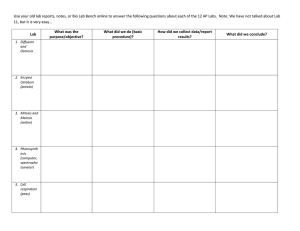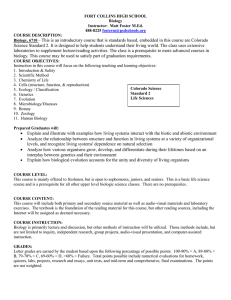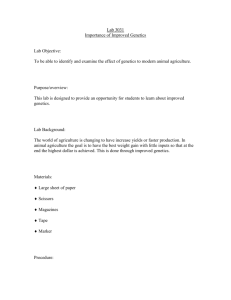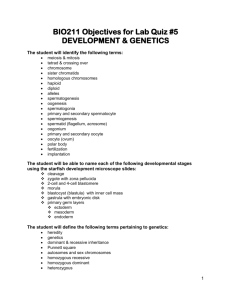FORT COLLINS HIGHS SCHOOL Cell Biology and Genetics
advertisement
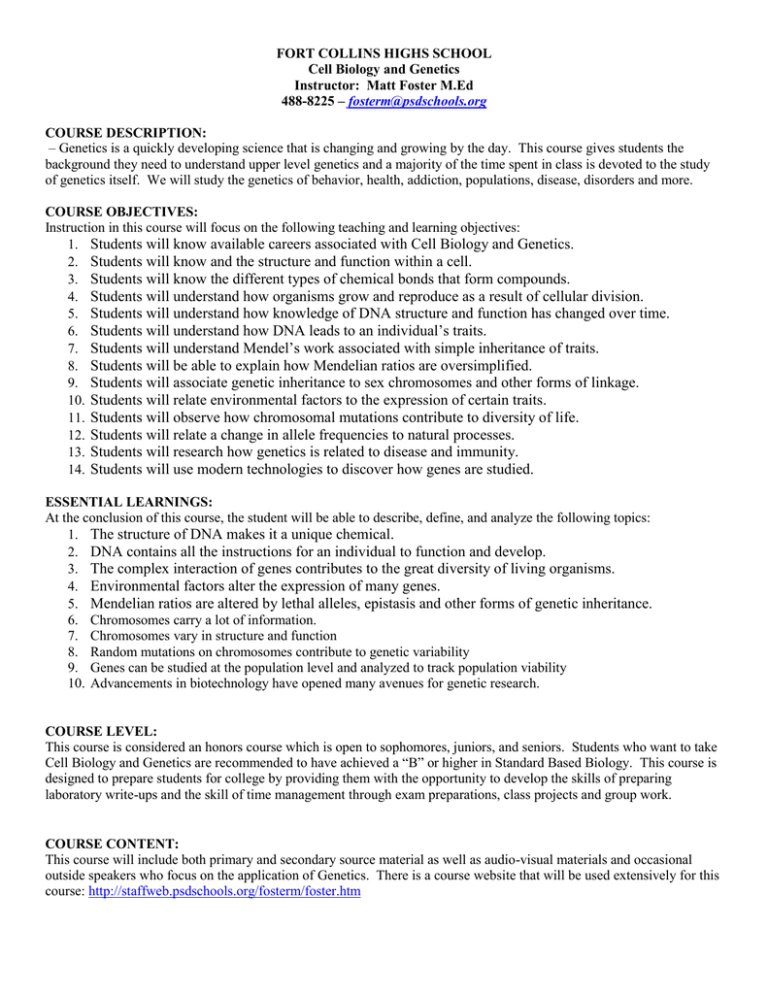
FORT COLLINS HIGHS SCHOOL Cell Biology and Genetics Instructor: Matt Foster M.Ed 488-8225 – fosterm@psdschools.org COURSE DESCRIPTION: – Genetics is a quickly developing science that is changing and growing by the day. This course gives students the background they need to understand upper level genetics and a majority of the time spent in class is devoted to the study of genetics itself. We will study the genetics of behavior, health, addiction, populations, disease, disorders and more. COURSE OBJECTIVES: Instruction in this course will focus on the following teaching and learning objectives: 1. Students will know available careers associated with Cell Biology and Genetics. 2. Students will know and the structure and function within a cell. 3. Students will know the different types of chemical bonds that form compounds. 4. Students will understand how organisms grow and reproduce as a result of cellular division. 5. Students will understand how knowledge of DNA structure and function has changed over time. 6. Students will understand how DNA leads to an individual’s traits. 7. Students will understand Mendel’s work associated with simple inheritance of traits. 8. Students will be able to explain how Mendelian ratios are oversimplified. 9. Students will associate genetic inheritance to sex chromosomes and other forms of linkage. 10. Students will relate environmental factors to the expression of certain traits. 11. Students will observe how chromosomal mutations contribute to diversity of life. 12. Students will relate a change in allele frequencies to natural processes. 13. Students will research how genetics is related to disease and immunity. 14. Students will use modern technologies to discover how genes are studied. ESSENTIAL LEARNINGS: At the conclusion of this course, the student will be able to describe, define, and analyze the following topics: 1. The structure of DNA makes it a unique chemical. 2. DNA contains all the instructions for an individual to function and develop. 3. The complex interaction of genes contributes to the great diversity of living organisms. 4. Environmental factors alter the expression of many genes. 5. Mendelian ratios are altered by lethal alleles, epistasis and other forms of genetic inheritance. 6. Chromosomes carry a lot of information. 7. Chromosomes vary in structure and function 8. Random mutations on chromosomes contribute to genetic variability 9. Genes can be studied at the population level and analyzed to track population viability 10. Advancements in biotechnology have opened many avenues for genetic research. COURSE LEVEL: This course is considered an honors course which is open to sophomores, juniors, and seniors. Students who want to take Cell Biology and Genetics are recommended to have achieved a “B” or higher in Standard Based Biology. This course is designed to prepare students for college by providing them with the opportunity to develop the skills of preparing laboratory write-ups and the skill of time management through exam preparations, class projects and group work. COURSE CONTENT: This course will include both primary and secondary source material as well as audio-visual materials and occasional outside speakers who focus on the application of Genetics. There is a course website that will be used extensively for this course: http://staffweb.psdschools.org/fosterm/foster.htm COURSE INSTRUCTION: Instruction in Cell Biology and Genetics is primarily hands on, but other methods of instruction will be utilized. Those methods include, but are not limited to, lecture, group projects, audio-visual presentation, and computer-assisted instruction. This course is fast paced and students are expected to learn some content outside of the classroom. Class time will emphasize the application of content using labs and discussion. GRADES: Letter grades are earned by the student based upon the following percentage of possible points: 100-90% = A, 89-80% = B, 79-70% = C, 69-60% = D, <60% = Failure. Total points possible include numerical evaluations for homework, quizzes, projects, research, unit tests, and comprehensive final examinations given at the end of each semester. STUDENT RESPONSIBILITIES - STUDENTS WILL ADHERE TO ALL FCHS POLICIES AND THE POUDRE SCHOOL DISTRICT “CODE OF CONDUCT” AT ALL TIMES TO INCLUDE, BUT NOT BE LIMITED TO, THE FOLLOWING: 1. Attendance – Students must attend class to receive the greatest benefit from instruction and class interaction. Students who miss class are never able to completely make up missed work. Nevertheless, students with excused absences will be allowed to make up work according to Poudre School District policy. It is the student’s responsibility to contact the instructor – outside of class – to complete missed assignments. Unless prior approval is granted by the instructor, late work will note be accepted. 2. Participation – Each student is responsible for participating in class discussions, making presentations when assigned to do so, and contributing to the learning environment of the class. In order to fulfill his/her responsibility, it is necessary to be in class, on time with all materials, including paper and a writing instrument. 3. Assignments – Students are responsible for coming to class prepared. All assignments are due at the start of the class on the date the assignment is due. Please consult the website or hard copy of assignments for due dates. 4. Food and Drink – Food and drink are not allowed in class, but water is permissible. If you find it necessary to chew gum, please keep it to yourself. 5. Electronic Devices – No electronic device of any kind may be used in class without permission. The presence of an electronic device during a test or quiz will be considered prima facie evidence of academic dishonesty. 6. Final Examination – The final exam is comprehensive exam and is therefore worth a large portion of a student’s grade. Failure to take the final examination may result in a failing grade for this class. 7. Extra Credit (points given with assignment) Extra Credit is given in genetics for various activities that go above and beyond the requirements for this course. If you have a project in mind let me know. Extra credit only counts if ALL your assignments have been turned in and all of your quizzes have been made up. If you have any “Z” scores in the grade-book at the end of the semester, your extra credit will be erased before the semester grade is calculated. No extra credit will be given the last two weeks of the semester, period. 8. Late Work/Missed Work Late work is defined as work that is not turned in at the beginning of the class in which it is due. Late work will be assigned a maximum of 50% credit. Students who are excused for being absent have two days to turn in work for every day they were absent for full credit. Students who are unexcused absent also have two days to turn in work for every day they were absent, but for 50% credit max. Students who are absent during a test or an exam may sometimes be given an alternate test upon returning to school (for test security purposes). ACADEMIC DISHONESTY: Each student is required to do his/her own work. Plagiarism and/or cheating will not be tolerated, and if detected, will result in disciplinary referral and action. The Fort Collins Student Handbook outlines the consequences for cheating and plagiarism, and the instructor will, with the assistance of an administrator, implement the policy. A first incident of plagiarism and/or cheating will result in a zero. Additional incidents may result in expulsion from school. Please consult the Handbook for the full text of the consequences for academic dishonesty.

